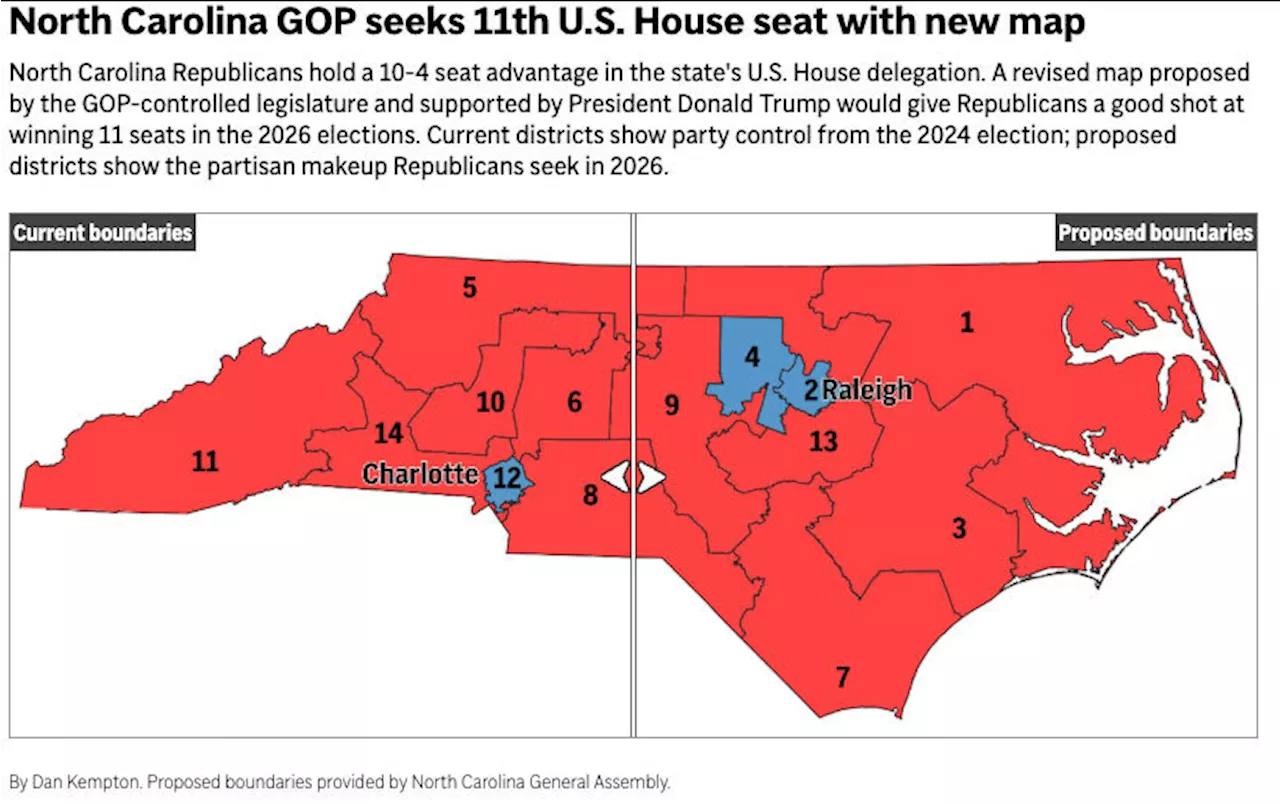Politics
North Carolina GOP Advances Congressional Map to Boost Election Odds

North Carolina’s Republican-controlled legislature has taken a significant step towards reshaping the state’s congressional landscape. On Tuesday, state senators approved a new congressional map aimed at enhancing Republican prospects in a district currently held by Democrat Don Davis. This proposed map has the potential to shift the balance of power in the state, which has been a battleground in recent elections.
The redrawn district is expected to make it easier for Republicans to challenge Davis in the upcoming 2024 elections. In the previous race, Davis managed to hold onto his seat despite a competitive environment, marking a rare success for Democrats in a state that has leaned Republican in many statewide elections. The new map modifies the boundaries of Davis’ 1st Congressional District, incorporating parts of neighboring Greg Murphy‘s 3rd Congressional District, which is held by a Republican.
While North Carolina currently has a Democratic governor, his ability to veto the map is limited. If the North Carolina House, where Republicans hold a majority, approves the map as anticipated, it will be implemented without the governor’s input. This legislative maneuver aligns with a broader national trend among Republican leaders seeking to bolster their party’s presence in key districts ahead of the 2026 midterms.
The urgency behind these changes is underscored by the current political landscape. With Democrats holding minority power in Washington, the House of Representatives is viewed as a critical battleground for regaining influence. Notably, Democrats believe that flipping as few as three seats in the 2026 elections could change the control of the House.
Republicans nationwide, including in states like Texas and Missouri, have been redrawing congressional maps to improve their electoral chances. In Texas, for instance, a new map was designed to flip five Democratic-held seats, while Missouri’s Republican leaders have successfully altered a long-held Democratic district in the Kansas City area. North Carolina appears poised to join these states in altering district lines to support Republican candidates.
Despite the shifts, North Carolina has not voted for a Democratic presidential candidate since 2008. However, the state’s competitive nature in statewide races remains evident, as evidenced by the current Democratic governor and other statewide officeholders. Presently, Republicans occupy ten of North Carolina’s fourteen congressional seats, reflecting a significant advantage.
Davis expressed strong opposition to the new map, describing it as “beyond the pale.” He highlighted the recent election where record voter turnout contributed to his victory as well as that of former President Donald Trump in the 2020 election. In contrast, Republican Senate leader Phil Berger defended the map, stating it aligns with the preferences of North Carolina voters who supported Trump in previous elections.
As discussions around congressional redistricting continue, North Carolina’s actions may set a precedent for other states considering similar changes. The political implications of the newly drawn districts will likely play a pivotal role in shaping the upcoming elections and the broader political dynamics in the United States.
-

 Science4 weeks ago
Science4 weeks agoALMA Discovers Companion Orbiting Giant Red Star π 1 Gruis
-

 Top Stories2 months ago
Top Stories2 months agoNew ‘Star Trek: Voyager’ Game Demo Released, Players Test Limits
-

 Politics2 months ago
Politics2 months agoSEVENTEEN’s Mingyu Faces Backlash Over Alcohol Incident at Concert
-

 World2 months ago
World2 months agoGlobal Air Forces Ranked by Annual Defense Budgets in 2025
-

 World2 months ago
World2 months agoMass Production of F-35 Fighter Jet Drives Down Costs
-

 World2 months ago
World2 months agoElectrification Challenges Demand Advanced Multiphysics Modeling
-

 Business2 months ago
Business2 months agoGold Investment Surge: Top Mutual Funds and ETF Alternatives
-

 Science2 months ago
Science2 months agoTime Crystals Revolutionize Quantum Computing Potential
-

 Top Stories2 months ago
Top Stories2 months agoDirecTV to Launch AI-Driven Ads with User Likenesses in 2026
-

 Entertainment2 months ago
Entertainment2 months agoFreeport Art Gallery Transforms Waste into Creative Masterpieces
-

 Health2 months ago
Health2 months agoGavin Newsom Critiques Trump’s Health and National Guard Plans
-

 Business2 months ago
Business2 months agoUS Government Denies Coal Lease Bid, Impacting Industry Revival Efforts









